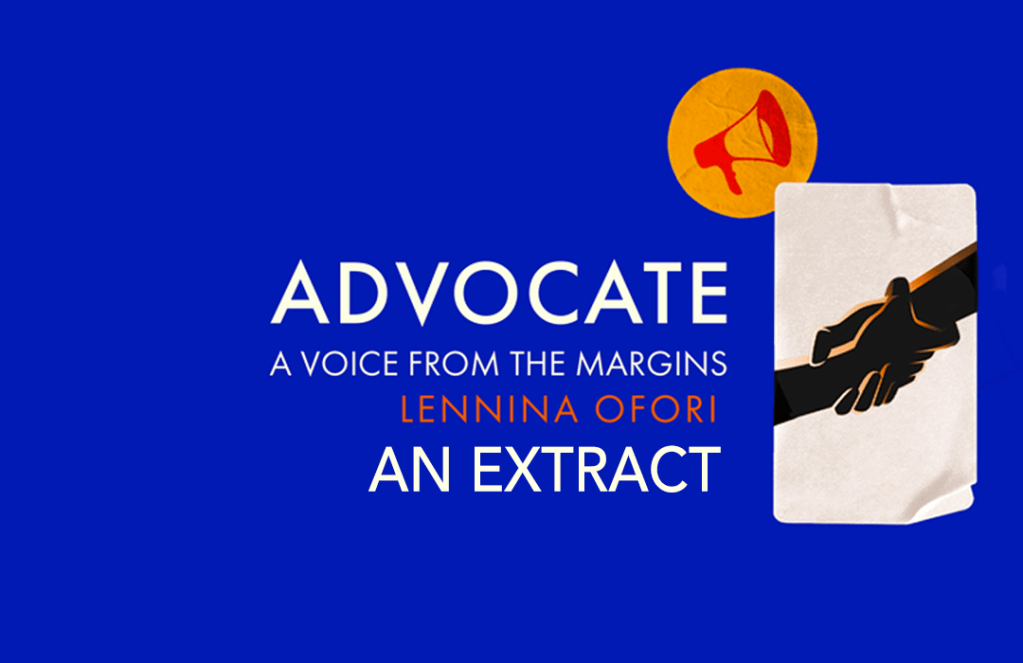Advocate by Lennina Ofori: An Extract

Lennina Ofori is a writer/director, consultant and educator, dedicated to children and young people services and diversity, equality and inclusion, for marginalised youth and adults. An alumna of the Royal Central School of Speech and Drama with an MA in Theatre and the Criminal Justice System, Lennina is currently undertaking a Doctorate in Children and Young People Services: Storytelling for system change. Lennina utilises storytelling, the arts and mentoring to influence decision makers and raise awareness on societal injustices including racial inequality, and in order to engage and empower clients, audiences, students.
A social entrepreneur, Lennina is founder of a housing company dedicated to supporting and nurturing looked after children who are 16+ and transitioning to adulthood.
Lennina has dedicated her career to ensuring that marginalised youth and adults are provided with equal opportunities, a level playing field and championing diversity and inclusion to encourage ambition and raised aspirations.
Advocate is a tale of personal resistance, but also a manifesto for action. With great candour, wit and beautiful language, Ofori will call you to make change not just for your own sake, but for those in the margins.
Introduction
A Voice from the Margins.
The title of this book can conjure the imagery of an American pastor about to preach or someone about to make a speech on behalf of a nation, ‘I am a voice from the margins.’ Perhaps, you could look at me as someone stepping up to a very rustic pulpit, the pages as my church, because, after all, without the pages I may have had nowhere else to place this amount of words.
I’m entirely self-conscious of saying I am speaking for those in the margins, like some quasi-deity, because I am not. However, I do know the margins. I know the margins from my personal experiences, some painful, some joyful, and from the battles within those betwixt and between moments. I am now an academic, an entrepreneur, a researcher wearing titles afforded mostly to those who often do not look like me or who may not have experienced varying degrees of marginalisation as I have. Therefore, I do not write this book from a place of snobbery. Synonymous with hooks, (activist and author) when writing her chapter Choosing the margins a place for open radicalness, ‘I am speaking from a place in the margins where I am different – where I see things differently.’
For me, being in the margins has meant:
- having a deep-rooted knowing, based on observations and experience in employment and self-employment, entrepreneurship, that you have to work twice as hard often at times to only achieve half as much as non- Black females because of the barriers in place. By the same measure, recognising that your efforts to do so are measured by a different social barometer
- growing up realising that not every opportunity that should be easily accessible to you actually is
- having to navigate situations remembering that your tone of voice may be policed or deemed as a weapon, leading others to label you as aggressive, problematic, or troublesome
- entering into spaces and not be accepted due to skin tone, gender, place of birth or residence
- finding that in a work setting, your ideas may be good enough to execute, yet you are not credited appropri- ately for the work or the concept
- being magnificent but made to feel less than
- raising children, ensuring they have confidence in who they are but also training them to know what to do when encountering: a) police; b) an obvious racist; c) an undercover racist; d) and the list continues
- raising Black sons to be vigilant at all times because of the ongoing pandemic of violence affecting young people
- knowing your gender could be used against you and deem you as weak, invalid
- witnessing your Black brothers face injustice at the hands of the police and the system overall
- having an innate desire that you must share power with others who need and deserve it at every oppor- tunity, because you know how hard it is to be seen and heard as a marginalised person
- being seen as having a chip on your shoulder when centring your Black womanhood, your identity, even though it is the only type of womanhood you’ve ever known, and that the two connected change everything
I felt it important to write this book to explore experiences that may have some women feeling less than, trapped or burdened by. Experiences that they may have moved to one side, taking up the mantle of strength that many marginalised women often have to. I wanted to also shed light on alternative endings, joy, happiness and hope; hope for those who have experienced hopelessness.
I began writing this book during the Covid pandemic, and at a time of civil unrest in the UK. At this time, it was as though everything had collided into one big trigger solely for Black people and also women, especially Black women! This period of time was bursting with instances of televised iPhone movies of police brutality, uprisings, an increase in gender- based violence, missing Black children.
I wrote this book at a time when it felt like women were not protected and when I was seeing constant negative images of Black youth perpetuated in the media. At a time when George Floyd was brutally killed by the police in the USA and we collectively held our breath during the trial. We then celebrated what should have been seen as the obvious con- viction of his murder, but what sadly we had feared may not happen. So much of what collectively as Black people, and in some parts, as women, we have known to be true was brought to the surface for the whole world to see.
I’m all too aware that many of my experiences may not be so uncommon, although they may be experienced in different ways by others. Yet they are often kept locked away within the souls of those women, or working-class people, and for those who are Black. hooks speaks about this entrapment, which many from the margins feel. I speak of hooks as she has a way of articulating the depths of invisibility, the sub- conscious performative living many of us embrace without even knowing it. As if it is part of our genetic makeup. bell hooks identifies a locked-awayness of sorts, in her book Talking Back, stating that ‘this is truly, on a deep level, a real race and class issue’.2 It is this locked-awayness and the ability to keep your business to yourself that means that many defi- nitions of the margins come from the mouth of those in the centre, speaking for us.
It is a hard truth that many people speak on varying issues within the margins, without themselves ever experiencing marginality or truly having empathy for those who have. However, these people often hold strong opinions and great power. They write policies, pass legislation, write papers and articles in public discourse, which in turn can influence our very experience in Britain all the more. This is why I have been compelled to raise my voice from the margins, writing the counter-narrative3 in public discourse, bringing it to the centre and to the mainstream.
I have written this book because I – along with many other women, those within the margins of society – have often been othered and misunderstood. Our forced and historical silence, and lack of safe spaces to speak, mean we have been spoken for, or spoken over. Therefore, throughout these pages I shall share stories and experiences that may resonate with some. Yet I also write to highlight that there are diversifi- cations of the Black British woman’s experience via the stories of my youth and womanhood. Contrary to popular belief, Black people, Black women, are not a monolith. As a Black British woman, in my adult life, the notion that Black women are monolithic is one I have encountered all too often. I have battled against this perception of being a Black woman meaning I must speak in a certain way, be strong, loud, aggressive or problematic.
To be monolithic is to be the same, exactly the same. I can stand with a Black woman who rocks the same braids as me and loves the same music yet has a completely different upbringing to me. If her grandmother is from Jamaica as mine was, she may have eaten similar foods. We might even have a joke about something that our grandparents have said religiously. These women, who share some of my experiences, may not have had the same parenting or schooling experience as me, nor frequent the same places to meet with friends.
It is important to share that I have spoken to many women who are drained by the suppressive and limiting clutches of racism. Sharing commonality and solidifying our sister- hood and understanding without even knowing each other because, more often than not, racism has synergised us to act collectively despite our individual differences. This is why I have chosen to write a book that unveils some of the issues we battle with, notions and conversations that are all too often kept within the margins, private, which need to be amplified in order to expose and make change.
Lennina Ofori is a force of nature. A teen mother, a supportive older sister, a PhD student, a support system, a working woman, a survivor, above all, she is an Advocate. She has spent her life working for those who do not have a voice, for those relegated to the margins, and in this book, she lends her voice to them.
Starting with her own life story, from her beautiful family, to her hardest struggles, Ofori opens the door to intersections that are familiar to many: race, class and gender, and uses her expertise to explain and embolden readers to make active change in their own lives. Utilising expertise from across the globe, from the teachings of bell hooks to government reports, Ofori makes accessible topics that are so often ignored. From her unique perspective as a Black woman who has lived many lives, Ofori is a daring voice for change, and a voice for hope, in modern life.
Advocate is a tale of personal resistance, but also a manifesto for action. With great candour, wit and beautiful language, Ofori will call you to make change not just for your own sake, but for those in the margins.







